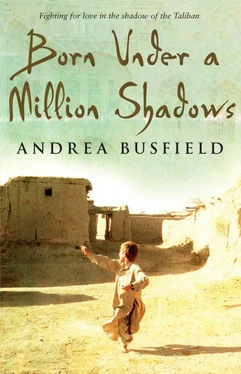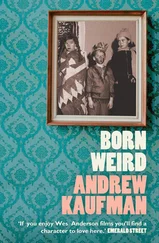I always knew the West was filled with crazy ideas, like scientists believing we all come from monkeys, but this was just incredible. I decided that as soon as I’d finished remembering the national anthem I’d write to President Karzai to warn him. There could be such a thing as too much democracy, and he should be made aware of that fact.
At the German hospital, the doctors in white coats confirmed May’s suspicions that my mother had cholera. They also confirmed that she would be fine. Because of the special water my mother had drunk she hadn’t gone into shock, which I was told was the biggest danger she had faced. However, the doctors insisted that she stay overnight in order to recover from her ordeal.
During that terrible twenty-four hours it was also agreed that when my mother came out she would go to live with Homeira and her family for a week in Qala-e Fatullah. Homeira’s employer, across the road from us, had also been kind, giving her the week off to look after my mother—although James said this had nothing to do with niceness and everything to do with not wanting to catch diseases from poor people.
“My home is only a ten-minute drive away, so come and visit anytime,” Homeira told me when she came to pick up some of my mother’s clothes. “My children would love to meet you.”
“Okay,” I agreed, although I was in no mood to make new friends and felt better staying with the friends I already had.
Georgie said that at the hospital my mother had been very against the idea of leaving me behind—right up to the point where she fell asleep, exhausted. However, both Georgie and May said they would look after me, and they promised my mother that not only would they guarantee I washed, said my prayers, and did my school assignments, they would also keep an eye on James and ban him from the house if need be.
I felt a bit sorry for James, who seemed genuinely hurt that no one thought he could be trusted to look after a boy, but if he hadn’t agreed to such supervision I was in no doubt that I would have been packed off to my aunt’s house—where I’m certain she would have tried to kill me too.
So that afternoon, after my mother had been hospitalized and May had admitted to her own sickness, my bed was temporarily moved into James’s room and placed at a right angle to his.
At first, the place was an absolute mess, filled as it was with piles of newspapers, dirty clothes, and books taking up every bit of space. A board similar to the one May had in her bedroom hung on the wall, now over my bed, but unlike May’s there were no family photographs pinned to it, just scraps of paper that seemed mostly to hold telephone numbers. A large knife was also stabbed into the board. I had seen James use it to clean the dirt from his nails.
As Georgie and James struggled to fit my bed into the corner of his room, I tried to help by shoving the other one closer to the far wall. As I did so a magazine escaped from the tangled mass of bedclothes, falling to the floor and opening at the center. The pages showed a blond-haired woman with soapy bubbles covering huge naked breasts.
Georgie and James looked at the magazine as if someone had just tossed a grenade into the room. For at least three seconds they stood in stunned silence, first looking at the naked woman, then at each other, then at me, then back at the magazine. I stooped to pick it up, but this seemed to knock the sense back into both of them, and as Georgie ordered “No!” James quickly swooped, beating me to it and snatching away the flapping pages, which he tucked into the belt of his trousers, under his sweater.
“Research, Fawad, research,” he explained.
“For all the work you do with the ladies?” I asked, remembering Georgie’s words and suddenly fitting them into place.
Most afternoons, after Georgie had finished with her job and Pir Hederi had finished with me, we would drive to Homeira’s house to spend an hour or so with my mother. The first visit we made was awkward and shy, but because I was relieved to see her alive I cried when she reached out to hold me, and because she was my mother she matched my tears with her own.
Although my mother looked better than the last time I’d seen her, and a lot cleaner, her face still shone pale and she looked fragile compared to her friend, who was as fat as Ibrar the Baker from Flower Street. However, despite my natural suspicion of anyone fat, which I think came from living with my aunt for so long, I liked Homeira. She was large and funny and smiled easily, in the way most people do when their stomachs are full. I was also mesmerized by her hands, which appeared to be holding prisoner a large number of rings—like small hills of flesh laying siege to valleys of gold on her fingers. There was no way they could possibly be removed, so I guessed they’d have to stay there until the day she died or until someone cut off her fingers—maybe the Taliban, if they came back.
Homeira’s husband was also quite fascinating in his fatness. If I squinted, closing my eyes half shut as if I was looking into the sun, I could clearly see the shape of his thin face battling to come out of the folds. It was like watching a man drowning in skin.
Not surprisingly, Homeira and her husband had made six plump children together—a collection of bellies waddling around the house on pudgy legs. They were friendly kids who shared their toys easily, and I was massively comforted to see my mother surrounded by such a large family, living in a house that was busy and alive and full of cheerful conversation. I was also relieved to know she’d be in no danger of starving.
What was surprising, however, was the discovery that Georgie and I weren’t my mother’s only visitors. Twice in five days I caught Shir Ahmad leaving the house, shyly waving at me as we passed each other on the street.
I guessed we’d soon have to have a talk, man to man.
But even though I was happy to see my mother being looked after for once in her life, I found it really difficult to be without her. I didn’t say anything because May had told me to be strong, so after my first tears at seeing her alive I didn’t cry again. But the truth was, she was my mother and I missed her so much that I now had a constant ache pounding at my insides. In all my years I had never been without my mother. When I went to bed at night, I placed her chador and her smell over my pillow, praying to Allah that she missed me just as much as I missed her and that she wouldn’t decide to stay with Homeira’s happy fat family.
As I struggled to get used to this new loneliness, I also sensed the same feeling in Georgie. The day after Christmas, Haji Khan had left for Dubai, telling her he had to sort out “some business” and promising to call. As usual Georgie spent the following days without him, holding her mobile phone and waiting for him to keep his promise.
Therefore, because God always provides, we now clung to each other’s company in the new-winter evenings, tied together because we were one and the same.
And it wasn’t only me and Georgie who missed the presence of my mother and Haji Khan; both James and May were also struggling to cope. Our family, which was made up of the motherless, husbandless, and, in two cases, wifeless, was dining pretty much every night on something called noodles—stringy lines of pasta that came from a package and were flavored with powdered water. It was okay at first, but after four nights I knew this wasn’t what our teachers would call a “well-balanced diet.”
Therefore it came as a blessed relief when Georgie informed me we would be hosting a party at our house to celebrate New Year’s Eve—the foreigners’ one, not mine. As you would expect in a place recently visited by near-death, when we sat on the long cushions in the front room to discuss the matter, everyone agreed it should be a quiet affair. As we went through the options it was almost as if we were holding a mini Shura, a council of elders—without all the beards, of course—and it made me feel impossibly grown-up. Georgie explained she’d prefer something quiet because she “wasn’t feeling up to a big one”; May revealed she “hated half the fuckers left here over the holidays anyway”; and James went along with the plan simply because he was outnumbered by the women—and, I think, trying to prove he could be a responsible adult. “Yes, quite right,” he muttered. “We’ve got the boy to think about.” Therefore with no one up for “a big one,” it was agreed that one guest each would be invited by those that could be bothered and the food would be ordered in from the Lebanese restaurant down the road.
Читать дальше












